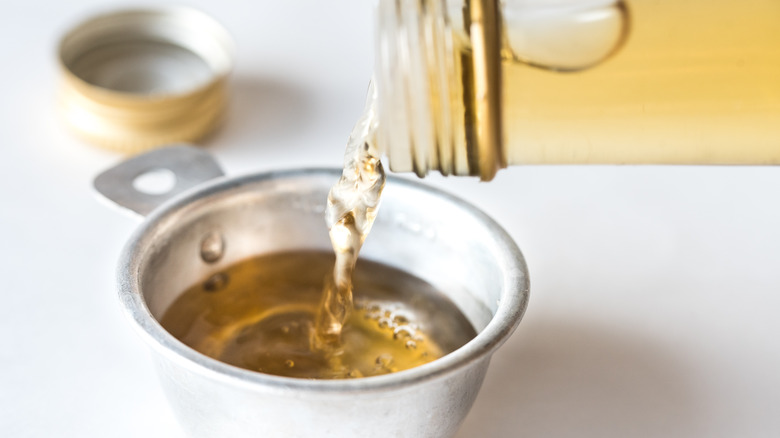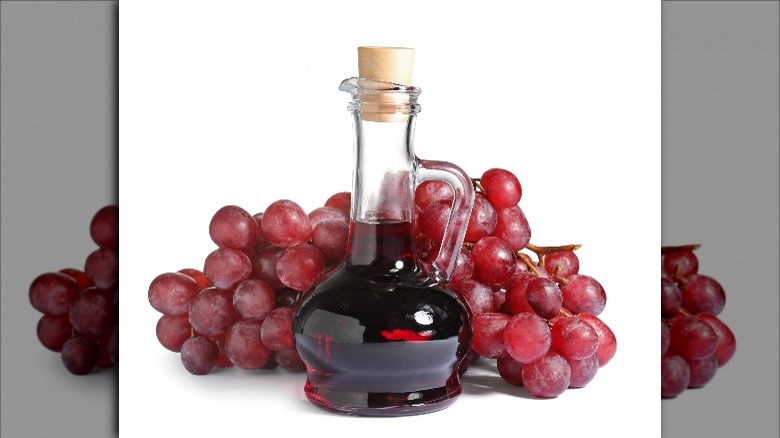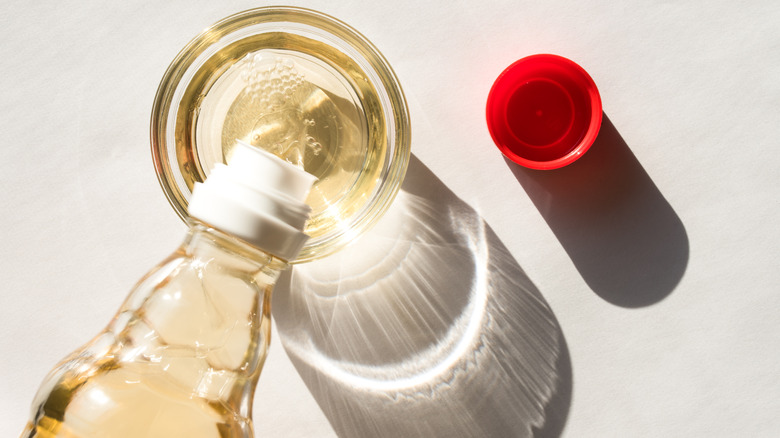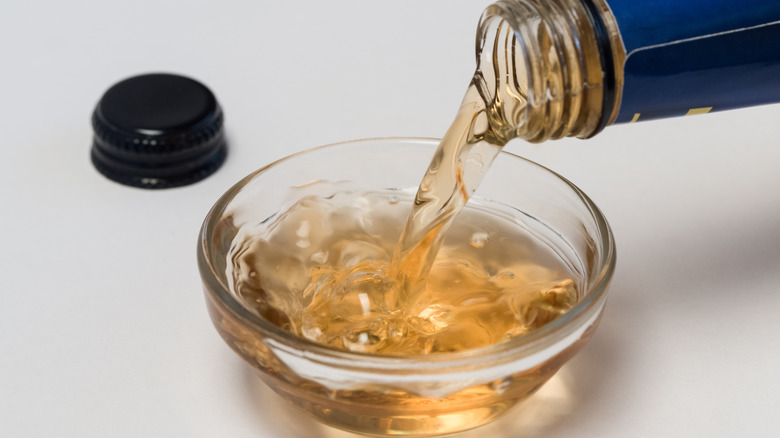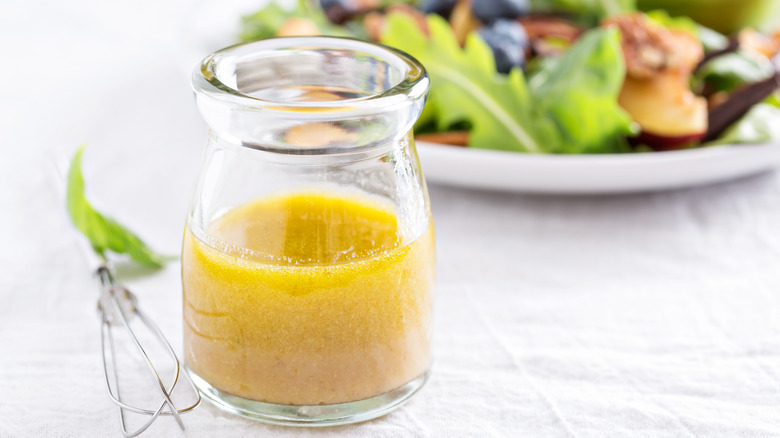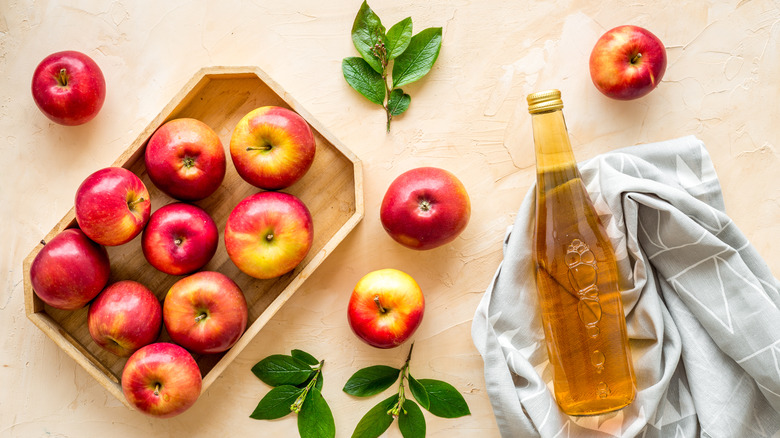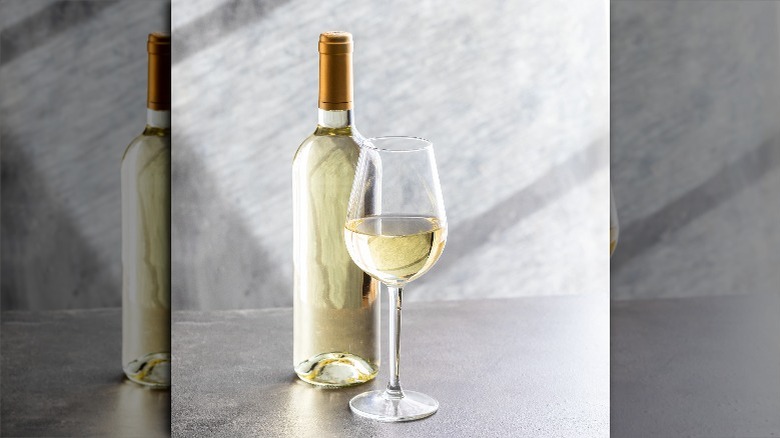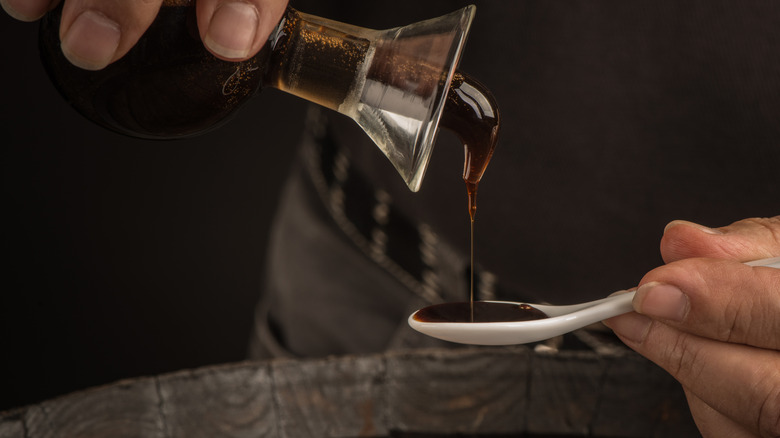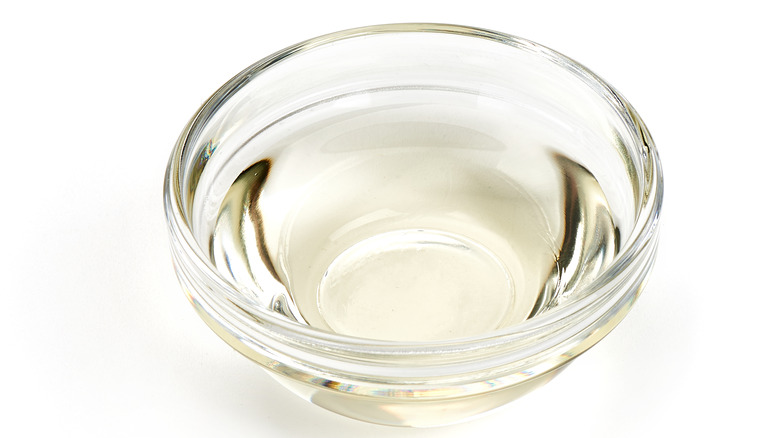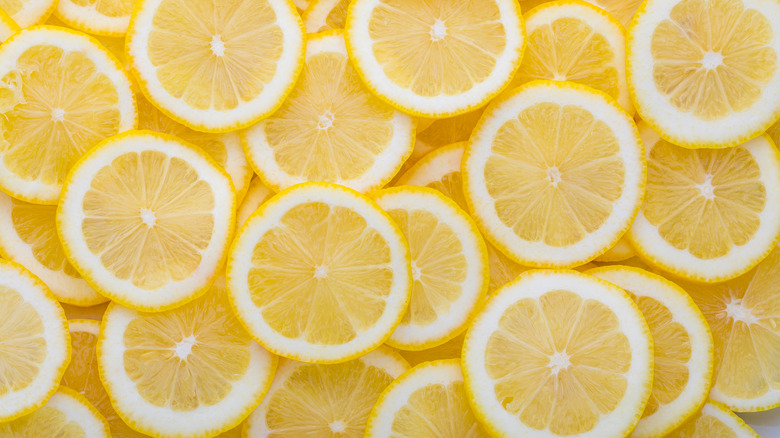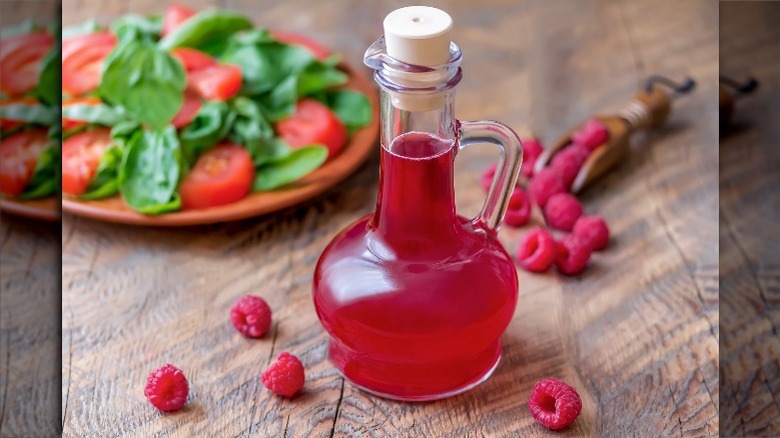10 Best Substitutes For White Wine Vinegar
If you're not very familiar with vinegars, then you might not know exactly how they are made or where they come from. As it turns out, white wine vinegar is simply wine that has been further fermented (via MasterClass). Using a catch-all blend of white wines known as "wine stock," the wine is oxidized until its acidity reaches around 5-7%.
While you might not use white wine vinegar very often, it is very helpful to have on hand if you are making dishes like pickles, hollandaise, potato salad, salad dressing or even braising some meats like chicken, via Master Class. In each of these dishes, white wine vinegar can brighten and enhance the flavors of the dish. In some cases, the vinegar serves to cut through the richness of the sauces like hollandaise or bearnaise. It's the mild tang of white wine vinegar that's not too sweet or sour that makes it so versatile in the kitchen, as other vinegars can be much stronger. However, should you run out there are tons of substitutes that can replace the white wine vinegar in a recipe. Spoiler alert: many of them are other types of vinegar.
1. Red wine vinegar
Red wine vinegar is a great option to substitute for white wine vinegar because both vinegars share a similar level of acidity, according to MasterClass. Though red wine vinegar might be slightly more acidic and has a more powerful flavor than white wine vinegar, it remains one of the best alternatives because they are both made from wine (via Foodi Ideas).
Because of its stronger flavor, red wine vinegar is best subbed into recipes that call for a fair amount of mouth-puckering flavors and tanginess. That's why Foodi Ideas suggests using it for vinaigrette, marinades, and pickle recipes.
Since the two types of wine vinegar are so similar, red wine vinegar can be added to a recipe in the same amounts as the white wine vinegar that it calls for. No need to dilute the vinegar with water. The simple one-for-one swap makes this a no-brainer substitute!
2. Rice wine vinegar
Rice wine vinegar is another great alternative because it, too, offers a good flavor while not being as overwhelming as red wine vinegar (via MasterClass). So, if you have rice wine vinegar on hand and don't want the vinegar to be quite as noticeable as red wine vinegar, reach for this bottle instead. Both white wine and rice wine vinegars share a similar flavor profile, though rice wine vinegar is slightly milder.
Rice wine vinegar is often used in Asian dishes like soups and stir frys, but it can also be used in place of white wine vinegar in tons of classic white wine vinegar recipes (via Foodi Ideas). For example, pickles, salad dressings, vegetable slaw like potato salad and sauces all work well with rice wine vinegar.
Like red wine vinegar, rice wine vinegar is a one-for-one substitute for white wine vinegar. So, add it in equal parts to the white wine vinegar a recipe calls for.
3. Sherry vinegar
According to The Spruce Eats, sherry is a fortified wine that hails from Spain and comes in many different flavor profiles. This third kind of wine-based vinegar is another great alternative to white wine vinegar. However, for a more successful white wine substitution, Foodi Ideas notes you'll want to make sure to use a sherry vinegar that's on the lighter or younger side so that the flavor isn't too potent.
Like most wine-based vinegars, this alternative is great for sauces and marinades as well as vegetable salads. It can also be substituted for the same amount of white wine vinegar a recipe calls for. Again, no need to dilute this wine-based vinegar. The only exception might be a stronger sherry vinegar such as one that is darker or made from older sherry. In that case, you might want to start with slightly less than sherry vinegar and add as needed.
4. Champagne vinegar
Because champagne vinegar is also made from champagne or white wine grapes, it is a great substitute for white wine vinegar that won't overpower (via Foodi Ideas). Champagne's light flavor is closer to white wine vinegar than say red wine vinegar, which means you can easily substitute it in. Even though champagne vinegar tends to be somewhat less noticeable than white wine vinegar, you don't have to worry about it making too much of an impact on whatever you're making.
To substitute champagne vinegar for white wine vinegar, you should add it in one and one half parts. So recipes that call for a tablespoon of white wine vinegar would need one and a half tablespoons of champagne vinegar. The extra champagne vinegar will help make up for the softer flavor it gives a dish. Use champagne vinegar for recipes that require more subtle flavors such as sauces, seafood, and salads, among others.
5. Apple cider vinegar
Apple cider vinegar can also be used as a substitute for white wine vinegar thanks to its very tangy flavor (via Foodi Ideas). However, since apple cider vinegar does have such a distinctive taste, it can add a noticeably different flavor to a dish than if you were to use white wine vinegar. For light-colored sauces like hollandaise, apple cider vinegar could also tint it. However, these differences will only be more apparent if a lot of vinegar is needed (via Oola).
Despite the risk of a sweeter flavor and color change, apple cider vinegar works best as a substitute when it is swapped in equal parts for white wine vinegar. Due to the sweet and sour flavors of apple cider vinegar, it is a great substitute for making pickles or marinades, per Foodi Ideas. It should only be used in dishes that consist of other strong flavors for it to compete with, so that the flavor of the apple cider vinegar does not overtake the entire dish.
6. White wine
White wine can also serve as an alternative to white wine vinegar. However, regular white wine has not been fermented like white wine vinegar, so it will lack some of the acidic, tangy punch that white wine vinegar offers while still being somewhat acidic (via Foodi Ideas). White wine is best to be substituted in for dishes that are going to be cooked instead of raw. When white wine is cooked, it reduces down and will become somewhat milder, so sauce recipes are one of the best places to use substitute white wine for white wine vinegar.
In order to get the same level of flavor as you would with white wine vinegar, you'll need to double the amount of white wine that you use in place of white wine vinegar. So if the recipe calls for one tablespoon of white wine vinegar, use two tablespoons of white wine instead.
7. Balsamic vinegar
Made from reduced grape juice, balsamic vinegar can be used as a white wine vinegar substitute due to their similar levels of acidity. It does, however, have its own distinct flavor. Balsamic vinegar is tangy and sweet like white wine vinegar, but it does have a stronger flavor and a deep color that could alter the appearance of some dishes. Because balsamic vinegar is so much more complex and quite different in terms of flavor, it is best used in dishes that it would otherwise be used for (via Foodi Ideas). Only substitute balsamic vinegar for white wine vinegar in similar dishes that often call for balsamic vinegar. Examples include marinades and salad dressings.
According to Oola, balsamic vinegar should be added into a dish in equal parts to how much white wine vinegar the recipe calls for. So, use a direct substitute of one-to-one in whatever you make with balsamic vinegar instead of white wine vinegar.
8. White vinegar
Plain white vinegar can be used in place of white wine vinegar, but it's a less-than ideal substitute. White vinegar is far more acidic than white wine vinegar, but apart from that, it offers little flavor to a recipe (via Oola). Made from grain alcohol, white vinegar can easily be used to make pickles as well as other dishes like salads, sauces, and more. However, it will require some tweaking before you add it into the dish.
White vinegar must be diluted before it is substituted in. Adding sugar to the diluted solution can help balance it out and add more flavor to a dish (via Foodi Ideas).
Use three parts white vinegar, one part water, and a pinch of sugar to make this white wine vinegar alternative a better substitute. For a single tablespoon, that would mean a 3/4 tablespoon of white vinegar with 1/4 tablespoon of water and a tiny bit of sugar.
9. Lemon juice
Lemon juice can be used in place of white wine vinegar, but it has its own distinct sharp, sour flavor. Though lemon juice is acidic, it does not cut through fat the same way that white wine vinegar does so avoid using it for sauces like hollandaise or bearnaise (via MasterClass). This is, in part, because lemon juice has a different kind of acid than white wine vinegar — citric instead of acetic. It is, however, perfect for salad dressings and marinades for all kinds of dishes (via Foodi Ideas).
Since lemon juice has a very strong and noticeable flavor, it cannot be used as a direct substitute for white wine vinegar. Instead, it has to be diluted with water. So, for every one part white wine vinegar, use half water and half lemon juice. For example, per tablespoon of white wine vinegar, you would use half a tablespoon of both water and lemon juice combined.
10. Fruit vinegar
A wide range of fruit vinegars can be used in place of white wine vinegar (via Foodi Ideas). The catch is that the fruit the vinegar is made from must be one that will work well with the overall dish, because the fruit vinegar will clearly taste like its namesake fruit. A fruit vinegar can be used for anything from salad dressings and sauces to marinades and more, but only if the other ingredients in the dish will marry well with the fruit. For example, a vinaigrette made with raspberry vinegar would work well with most salads so long as its toppings pair well with raspberries (such as pecans or a tangy cheese) to balance the sweetness from the raspberries.
There are no hard and fast rules for substituting in fruit vinegar, but you should remember that it will be less acidic and sweeter than white wine vinegar. You might want to start with an equal part substitution and increase as needed. Adding a touch of another acid like white vinegar or lemon juice might also be helpful for balancing out the sweetness.
